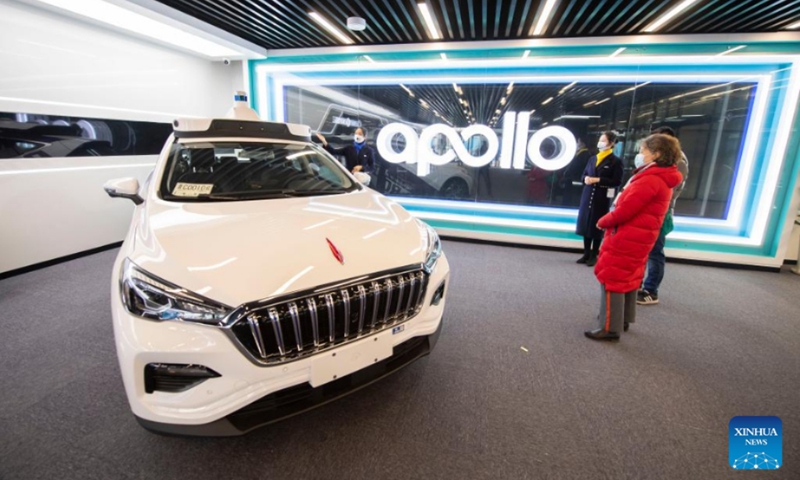
A staff member introduces an unmanned car at Apollo Park in Yangquan, north China's Shanxi Province, Feb. 25, 2022. (Xinhua/Yang Chenguang)
Apollo Go Robotaxi, Baidu's autonomous ride-hailing platform, has been gaining public attention as it is winning new business in Wuhan, Central China's Hubei Province, while market analysts even predicted that it could pave the way for the commercial services.
"Taking a robotaxi is indeed cheaper than a traditional one. The interior of the vehicle is clean and smart, allowing passengers to choose their preferred music. Additionally, with no driver in the car, I can avoid interactions and contact, making it easier to rest," a local rider in Wuhan told the Global Times on Wednesday.
In Wuhan, a 10-kilometer ride in a self-driving robotaxi costs between 4 and 16 yuan ($0.60-$2.30), whereas a regular ride-hailing service costs between 18 and 30 yuan. Consumers can book fully autonomous robotaxis at any time of day through various the Baidu apps in the pilot areas.
Data from Baidu shared with the Global Times showed that there are 300 fully driverless taxis operating in Wuhan.
There are two kinds of robotaxis in Wuhan - One is fully driverless robotaxis without human supervision, and the other is taxis with human drivers as the safety operators behind the wheel.
In the first quarter of 2024, bookings for fully driverless taxis in Wuhan accounted for 55 percent of all ride-hailing services.
This figure exceeded 70 percent in April, with expectations of sustained rapid growth ahead and reaching 100 percent over the coming quarters. Looking ahead, we plan to deploy RT6, our sixth generation robotaxi in the Wuhan this year, which will significantly reduce hardware depreciation costs, Robin Li, Baidu's founder, said during the company's the first quarter 2024 earnings call in May.
With the scaling of driverless operations and continuous improvement of cost structure, we believe Apollo Go Robotaxi will achieve operational UE breakeven in Wuhan in the near future. We will closely monitor efficiency and persist in optimizing the operation of our overall intelligent driving business, he added.
The robust development of the robotaxis operated by Baidu is due to the accelerated development of the technology, and the supports from policies and infrastructure, Wu Shuocheng, a veteran automobile industry analyst, told the Global Times on Wednesday.
The rising demand also triggers debates online, with some claiming it would lead to job losses for taxi drivers.
Robotaxis have some drawbacks. "The wait time is long, taking 8-10 minutes from order to arrival, and the driving speed is slow, not an ideal choice for passengers in a hurry," one rider commented.
"Some routes aren't the shortest; it only follows the system's internal paths, and it may take more time," the rider added.
"I don't think we will lose our jobs because many people feel unsafe sitting in autonomous cars, especially during rush hours in Beijing," a taxi driver working for Didi Chuxing, a Chinese ride-hailing company, told the Global Times on Wednesday.
"In an emergency, passengers cannot communicate flexibly with an autonomous car. Most people won't risk their lives just to save a bit of money," he added.
Also, there are no clear and unified policies regarding accidents caused by autonomous driving up to now. "Clearly defining each party's responsibility in the event of an accident is essential before the large-scale commercialization of robotaxis. For example, if an accident occurs due to a network signal interruption, which party should be held responsible?" Wu said.
Apollo Go Robotaxi is on the track to achieve profitability with its advanced autonomous ride-hailing model. Passenger testing operations have been launched in 11 cities and fully autonomous driving tests have been carried out in Beijing, Wuhan, Chongqing, Shenzhen, and Shanghai, according to Guotai Junan Securities' report.
Outside of Apollo Go, there are some different brands testing autonomous ride-hailing services nationwide. On June 23, AutoNavi and WeRide launched such services in Guangzhou's Huangpu district. On June 27, Didi Chuxing announced autonomous ride-hailing trials in parts of Shanghai.




